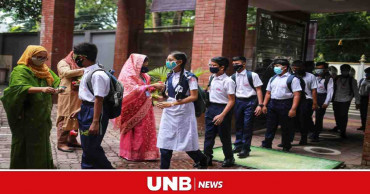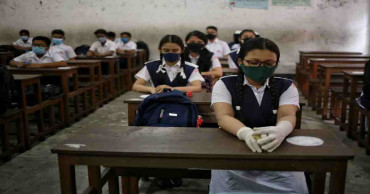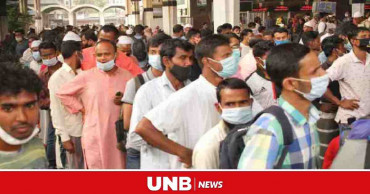Covid surge
WHO 'continues to urge' China to share more data amid Covid surge
The UN health agency has "continued to urge China" to share more rapid, regular, reliable data on hospitalisations and deaths, as well as more comprehensive, real-time viral sequencing in the wake of a Covid surge in the East Asian country.
"The World Health Organization (WHO) is concerned about the risk to life in the world's most populous country and reiterated the importance of stepping up vaccination coverage, including booster doses," WHO Director-General Tedros Adhanom Ghebreyesus said recently in his first online briefing for the year.
"With circulation in China so high and comprehensive data not forthcoming – as I said last week it is understandable that some countries are taking steps they believe will protect their citizens," he added.
Several countries, including the US, have announced new Covid testing requirements for travellers from China to gain domestic entry, amid concerns over the spread of the latest variants.
WHO Emergencies Director Dr Mike Ryan said: "We know there are difficulties in all countries very often in recording hospital releases, admissions and use of ICU (intensive care unit) facilities."
"We believe that the current numbers being published from China underrepresents the true impact of the disease in terms of hospital admissions, in terms of ICU admissions, and particularly in terms of deaths."
Also Read: Is China sharing enough COVID-19 information?
WHO has held high-level meetings with Chinese authorities over the past week to discuss the rise in cases and hospitalisations.
The UN agency's Technical Advisory Group on Virus Evolution (TAG-VE) also met with Chinese experts to discuss the situation.
During that meeting, scientists from the Chinese Center for Disease Control and Prevention presented data from what they described as imported and locally acquired coronavirus infections.
The analysis showed that most of the viruses circulating in the country are of two Omicron lineages, BA.5.2 and BF.7, which accounted for 97.5 percent of all local infections, as well as a few other known Omicron sublineages.
"These variants are known and have been circulating in other countries, and at present no new variant has been reported by the China CDC," the TAG-VE said in a statement on Wednesday.
So far, 773 sequences from mainland China have been submitted to the virus database operated by the global science initiative, GISAID.
Most, 564, were collected after December 1. Of this number, only 95 are labelled as locally acquired cases, while 187 are imported and 261 "do not have this information provided."
The majority of the locally acquired cases, 95 percent, belong to the two Omicron lineages.
"This is in line with genomes from travellers from China submitted to the GISAID EpiCoV database by other countries. No new variant or mutation of known significance is noted in the publicly available sequence data," the statement said.
Tedros said the pandemic is now in its fourth year, and despite progress, it is still a threat to health, economies, and societies.
"We are really concerned about the current Covid-19 epidemiological picture, with both intense transmission in several parts of the world and a recombinant sub-variant spreading quickly," he said.
Covid was on the decline for most of 2021, Tedros added, citing factors such as increased vaccinations worldwide and the identification of new lifesaving antivirals.
However, there are still major inequities in access to testing, treatment and vaccination.
"Every week, approximately 10,000 people die of Covid-19, that we are aware of. The true toll is likely much higher," he said.
Also, the Omicron subvariant XBB.1.5 is on the rise in the US and Europe and has been identified in nearly 30 countries.
XBB.1.5 was initially detected in October 2022. It is the most transmissible subvariant yet, according to Dr Maria Van Kherkove, the WHO technical lead for Covid.
"We do expect further waves of infection around the world, but that doesn't have to translate into further waves of death because our countermeasures continue to work," she said.
Meanwhile, the TAG-VE experts are also working on a related risk assessment that should be published in the coming days.
Dr Van Kherkove emphasised the importance of continued Covid surveillance around the world to track known subvariants that are in circulation.
Last month, more than 13 million cases of the disease were reported, though the WHO believes the toll is higher.
"But more concerning, we've had a 15 percent increase in deaths in the last month and again, we know that that is an underestimate because there are delays in reporting, and with the holiday period and with mixing, those trends are expected to continue," Dr Van Kherkove said.
3 years ago
Social distancing norms flouted at Kamalapur railway station amid Covid surge
Social distancing went for a toss as thousands of people thronged Kamalapur Railway station on Tuesday to buy train tickets ahead of Eid-ul-Azha amid an uptrend of Covid infections in Bangladesh.
People, most of them without masks, were seen waiting in long queues in front of ticket counters at Kamalapur Railway station as only four days left before Eid.
Bangladesh Railway started selling advanced tickets from July 1 as the country is going to celebrate the second biggest religious festival of the Muslims on July 10.
Read: Ensure wearing masks, social distance, health guidelines amid Covid surge in world: NTAC
However, as the wait turned longer by hours, the gaps between the lines narrowed to invisible as holidaymakers went anxious whether they would get their desired ticket or not.
The country registered 12 Covid-linked deaths on Monday which is highest in the last four months along with 2,285 fresh infections, according to the Directorate General of Health Services (DGHS).
The country last reported 13 Covid-linked deaths with 368 cases while the daily positivity rate was at 2.11 per cent on March 5 this year. The daily positivity now stands at 16.51 per cent following a rising trend of cases.
3 years ago
NTAC recommends avoiding public gatherings to fight Covid surge
In the wake of fresh surge in Covid cases in the country, the National Technical Advisory Committee (NTAC) on Covid-19 placed six recommendations to contain its spread.
The Cabinet Division issued a notification on Tuesday requesting all concerned to implement the recommendations of NTAC.
Read:Health Minister concerned over uptick in Covid, urges return to protocols
The recommendations include:
1. Requesting media to raise awareness among people for maintaining health guidelines
2. Making use of mask mandatory everywhere, enforcement of ‘No mask no service’ policy, ensure social distancing and avoid public gatherings.
3. Ensure use of mask and maintain social distance in all religious places including mosques, temples and churches.
4. Asking people to undergo Covid-19 test if they see Covid symptoms including fever, cough and cold.
5. Ensuring mask use at all shopping malls, shops, markets, hotel-restaurants or facing legal action.
6. Imams of mosques to give sermons for maintaining health guidelines and wearing masks to all during Juma prayers.
The Cabinet also asked the authorities concerned to take necessary steps to implement the recommendations.
Covid-19 situation
Bangladesh registered three more Covid-linked deaths with 2,087 new infections in 24 hours till Tuesday morning.
The new figures took the country’s total death toll to 29,145 while the caseload to 19,69, 361, according to the Directorate General of Health Services (DGHS).
The daily-case positivity rate slightly increased to 15.47 per cent from Monday’s 15.20 per cent as 13,489 samples were tested during the period, said the DGHS.
The mortality rate remained unchanged at 1.48 per cent. The recovery rate declined to 96.84 per cent from Monday’s 96.93 per cent as 200 patients recovered during this period.
In May, the country reported only four Covid-linked deaths and 816 new cases, while 7,356 patients recovered from the disease, according to the DGHS.
Among the four deaths during the period, one was vaccinated with a single dose of Covid vaccine while three were vaccinated with two doses.
Read: Bangladesh sees 3 more Covid deaths, 2,087 new cases
The country reported its first zero Covid death in a single day on November 20 last year, along with 178 cases, since the pandemic broke out here in March 2020.
On January 28, Bangladesh logged its previous highest positivity rate of 33.37 per cent.
The country registered its highest daily caseload of 16,230 on July 28 last year and daily fatalities of 264 on August 10 in the same year.
3 years ago
Ensure wearing masks, social distance, health guidelines amid Covid surge in world: NTAC
Expressing deep concern over the recent surge of Covid-19 cases across the world, the National Technical Advisory Committee (NTAC) on Covid-19 recommended ensuring 100 per cent use of mask, social distance and maintaining health guidelines to contain the spread of the virus.
The recommendation was made at the 57th meeting of the committee on Sunday, said a press release signed by Dr Mohammad Shahidullah, president of the NTAC.
The committee also recommended creating awareness about the rising of Covid-19 cases through publicity.
Read: Money laundering case: 11 including brothers Enamul, Rupon get 7 years jail
NTAC recommended ensuring Covid-19 negative certificates while entering Bangladesh from those countries where Covid-19 cases are on a rising trend.
It also suggested strengthening the screening of passengers at all ports.
The committee recommended ensuring wearing of masks in shopping malls, markets, shops and during travel in different parts of the country on the occasion of Eid-ul-Fitr.
It also asked the Islamic Foundation to ensure health protocols during Tarawih prayer and Eid Jamaat.
The NTAC also asked the Health Ministry to take steps to provide directives to tackle Covid-19 after arranging meetings with the hospitals and Directorate General of Health Services.
3 years ago
Follow health guidelines strictly at educational institutions: Minister
Urging all to abide by health guidelines at educational institutions, Education Minister Dipu Moni has said they do not want to shut those again due to Covid surge.
“We have resumed classes after a long time and we do not want to shut educational institutions again,” said Dipu while talking to reporters after inaugurating the piloting activities of New National Curricula of 2023 virtually from National Curriculum and Textbook Board (NCTB) auditorium on Tuesday.
Read: Senior schools, universities reopen after a month
She urged guardians, teachers and students to be aware of health protocols and maintain those properly.
Talking about the new curricula, the students will learn lessons by themselves and they will grow as skilled, eligible and good human being , she said adding, “Our motive is to achieve our national goals and build a peaceful and prosperous country.”
The guardians and the teachers have been requested to identify the problems of the curricula so that those can be fixed, said Dipu.
Deputy Minister for Education Mohibul Hasan Chowdhury Nowfel, who was also present at the promramme, urged all concerned to perform their duties sincerely and implement the new curricula.
“The teachers will identify the problems and weaknesses of the curricula so that students get modern and standard curricula,” he said.
3 years ago
Covid-19 in Bangladesh: Daily deaths hit 43
Bangladesh logged 43 more Covid-linked deaths with 8,354 fresh cases in 24 hours till Tuesday morning.
The daily positivity rate slightly declined to 20.03 from Monday’s 21.07 per cent after testing 41,879 samples during the period, according to the Directorate General of Health Services (DGHS).
The number of deaths is highest in nearly six months as the country last recorded 43 deaths on September 19, last year with 1,383 cases and the daily positivity rate at 5.62 per cent.
Read:Single-dose Sputnik Light Covid-19 vaccine gets EUA in India
On Monday, Bangladesh reported 38 more Covid-linked deaths with 9,369 fresh cases.
The fresh numbers took the country’s total fatalities to 28,670 while the caseload mounted to 1,879,255.
Among the new deceased, 26 were men and 17 women.
Fifteen of the deaths were reported in Dhaka division while 13 in Khulna, 11 in Chattogram, two in Rajshahi, and one each in Mymensingh and Rangpur divisions.
Meanwhile, the mortality rate remained static at 1.53 per cent.
However, the recovery rate slightly increased to 86.36 per cent with the recovery of 10,800 more patients during the 24-hour period.
On January 28, Bangladesh logged its earlier highest daily positivity rate at 33.37 per cent reporting 15,440 cases and 20 deaths.
On December 9 last year, Bangladesh again logged zero Covid-related death after nearly three weeks as the pandemic was apparently showing signs of easing.
Read: A different COVID-19 vaccine debate: Do we need new ones?
The country reported this year’s first zero Covid-related death in a single day on November 20 last year along with 178 infections since the pandemic broke out in Bangladesh in March 2020.
Besides, the country registered the highest daily caseload of 16,230 on July 28 last year, while the highest number of daily fatalities was 264 on August 10 last year.
4 years ago
Covid surge: Closure of schools, colleges extended until Feb 20
The government on Wednesday extended the closure of secondary and higher secondary-level educational institutions by two weeks until February 20, taking the worsening Covid-19 situation in the country.
“The closure of schools and colleges has been extended by two weeks,” MA Khair, public relations officer of the Education Ministry, told UNB.
Read: Keep schools open to avert learning catastrophe: UNICEF
On January 21, the government announced that all the schools and colleges of the country will remain closed from January 21 to February 6 in an effort to curb the spread of Covid-19 pandemic.
The following day, the Ministry of Education issued an 11-point directive, including resuming online classes, for schools and colleges during the closure.
Besides, the vaccination of students aged between 12 to 17 years against Covid-19 was directed to be continued following the health guidelines in coordination with the zonal offices of the Directorate of Secondary and Higher Education, District Education Office, Upazila Secondary Education Offices, local administration and Civil Surgeons.
After a long closure due to the pandemic, the students of schools and colleges in Bangladesh returned to their classrooms on September 12 last year.
Read:Schools, colleges to return to online classes: Ministry
The government shut the educational institutions on March 17, 2020, after the country reported its first Covid-19 cases on March 8 and later the closure was extended several times.
4 years ago
Covid surge in Rajshahi: Shops, restaurants to shut by 8pm
Rajshahi district administration has ordered closure of shops, shopping malls, recreation centers, restaurants and all business establishments by 8 pm amid an alarming surge in Covid cases in the district.
The directive will be effective from January 29 along with all other directives imposed by the government to curb Covid-19 until any further notice, according to a notice issued by Abdul Jalil, Deputy Commissioner of the district.
DC Abdul Jalil said the decision was taken on Friday night in an emergency meeting of the district Covid control and prevention committee.
Also read: Covid breaches BPL, Dhaka’s Isuru tests positive
The decision it was announced through mike on Friday, he said.
Besides, a team was formed and police administration was informed to enforce the decision.
On Friday the case positivity rate in the district stood at 64.52 per cent after detecting 120 cases among 186 sample tests, said Brigadier General Shamim Yazdani, director of Rajshahi Medical College and Hospital (RMCH).
Also read: Environment Minister contracts Covid again
On Thursday the positivity rate was at 74.84 per cent, he said.
Four more people died of Covid at RMCH in the last 24 hours till Saturday morning, he said
4 years ago
NTAC places 5 recommendations to contain Covid surge
The National Technical Advisory Committee (NTAC) on Covid-19 has placed five recommendations to contain the current Covid surge in Bangladesh.
The committee issued the recommendations following its 53rd meeting held on Wednesday.
Read:Covid spreading fast in Bangladesh; infection rate hits 25.11%
The recommendations are:
- Covid-19 positive patients will remain in isolation for up to 10 days after showing covid symptoms. Besides, people who come in contact with Covid patients with no symptoms do not need to be quarantined, but they must wear a tight mask.
- The committee recommended the Directorate General of Health Services (DGHS) to increase surveillance in all ports of entry, including airports, to ensure proper health guidelines issued by the government.
- All-time emergency treatment of all Covid-19 and non-Covid patients in all government hospitals is recommended to be ensured.
- It is recommended to take steps for the implementation of the Cabinet’s notification regarding covid restrictions by involving all stakeholders such as leaders of Transport Owners’ Association, Shop Owners’ Association, and Restaurant Owners’ Association.
- The committee recommended the government to distribute free masks to the public to ensure that people wear masks. It is also recommended to the public representatives and religious representatives to encourage people to wear masks properly and follow other hygiene rules.
Covid situation in Bangladesh
Bangladesh reported 12 more Covid-linked deaths with 9,500 fresh cases in 24 hours till Wednesday morning following a continuous rise in its infection rate.
Read: Covid in Bangladesh: 10 more districts designated ‘red zones’
The positivity rate in the country further increased to 25.11 per cent from Tuesday’s 23.98 per cent after testing 37,573 samples, according to the Directorate general of health Services (DGHS).
The fresh numbers took the country’s total fatalities to 28,176 while the caseload mounted to 1,642, 294 on Wednesday.
Meanwhile, Bangladesh’s total tally of Omicron cases reached 55 with the detection of 22 more cases till Monday, according to GISAID, a global initiative on sharing all influenza data.
4 years ago
COVID deaths and cases are rising again at US nursing homes
COVID-19 infections are soaring again at U.S. nursing homes because of the omicron wave, and deaths are climbing too, leading to new restrictions on family visits and a renewed push to get more residents and staff members vaccinated and boosted.
Nursing homes were the lethal epicenter of the pandemic early on, before the vaccine allowed many of them to reopen to visitors last year. But the wildly contagious variant has dealt them a setback.
Nursing homes reported a near-record of about 32,000 COVID-19 cases among residents in the week ending Jan. 9, an almost sevenfold increase from a month earlier, according to the Centers for Disease Control and Prevention.
A total of 645 COVID-19-related deaths among residents were recorded during the same week, a 47% increase from the earlier period. And there are fears that deaths could go much higher before omicron is through.
Read:University of Michigan removes Schlissel as school president
Despite the rising numbers, the situation is not as dire as it was in December 2020, when nursing home deaths per week topped out at about 6,200. Experts credit the high vaccination rates now among nursing home residents: About 87% are fully vaccinated, according to CDC data.
COVID-19 shots and boosters provide strong protection against severe illness, hospitalization and death, but the sick and elderly are uniquely vulnerable to the virus.
Nursing home officials say they are responding to the outbreak by limiting visitors to common areas instead of allowing them into residents’ rooms, and by reinstituting social distancing.
Some states, like New York, have put their own measures in place, like requiring proof of a negative test for visitors and providing all with surgical masks.
Nursing homes are also working to drive up vaccination numbers, especially for boosters. Sixty-three percent of nursing home residents nationally have received an extra dose.
Booster numbers are much worse for staff members. About 83% are fully vaccinated, but only 29% have gotten an extra dose.
Nursing homes have been holding vaccine clinics and town hall meetings to stress the importance of the shots.
They also got another tool to increase vaccinations Thursday when the U.S. Supreme Court upheld a Biden administration vaccine mandate for most health care workers in the U.S.
About 57,200 nursing home workers — by far the highest number on record during the pandemic — had the virus in the week ending Jan. 9, a more than tenfold increase from a month earlier, according to the CDC.
Sharon Wheeler was shocked to learn that her 88-year-old, dementia-stricken father recently contracted COVID-19 at a Naperville, Illinois, nursing home. She said she hopes the fact that he is fully vaccinated and boosted will help him pull through.
She said she suspects visitors and residents coming and going around the holidays brought COVID-19 inside. Wheeler hasn’t been allowed to see her father, but the staff told her he had mild symptoms.
“I worked so hard to make sure he never got (COVID-19), because I was so terrified,” she said. “He’s such an older man, and I don’t want to lose him this way.”
Vaccines are just one of the many tools that should be used to defend the elderly against omicron, said Eric Feigl-Ding, an epidemiologist and senior fellow at the Federation of American Scientists. He also recommended testing of visitors, mandatory boosters and the use of medical-grade masks like N95s and high-efficiency air filters.
“We need to build a Fort Knox around protecting nursing homes, but we’re not doing that right now, and that’s why cases are surging,” Feigl-Ding said Thursday. “We’re going to have exponential numbers of hospitalizations and deaths.”
Read:Chicago students stage walkout, say COVID protocols lacking
The virus dealt a devastating blow in late November to the New Hampshire nursing home Todd Fernald runs, called Webster at Rye, where 100% of residents and staff were vaccinated — but not boosted.
“COVID ripped through this building in 10 seconds,” Fernald said, recalling how, on the day that extra shots were scheduled to be administered, an outbreak occurred that would ultimately kill six residents, infect dozens of others and sicken 20 employees.
Since then, nearly all residents have been boosted, and employees are getting their third shots.
“I only lost one employee who didn’t want to be vaccinated and chose to resign their job,” Fernald said. “I’m having more and more people each and every week that I see are getting boosted and bringing me their booster cards.”
Making sure that facilities have supplies like tests is crucial too, said Lisa Sanders of LeadingAge, an association of nonprofit providers of aging services, including nursing homes.
“Older adults and the people they care for should be prioritized for support and supplies as they become available,” Sanders said.
4 years ago







.jpg)






